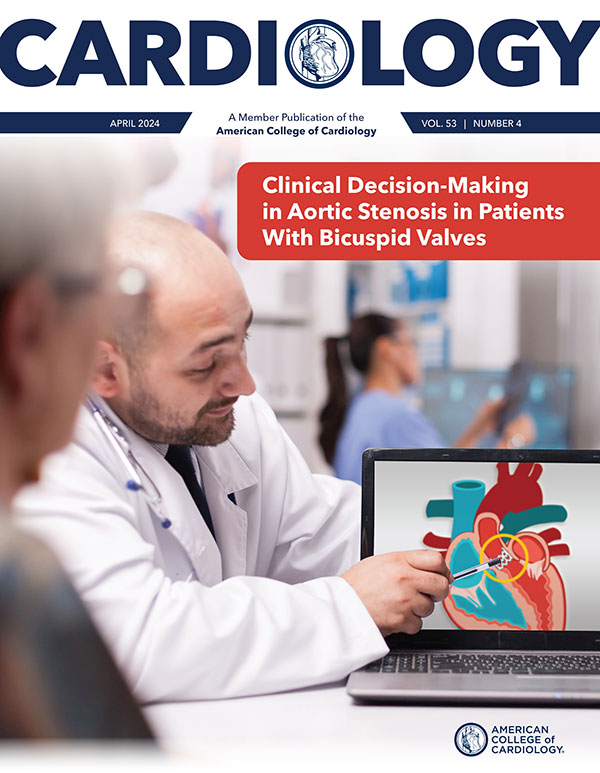Feature | Driving Urgency in LDL Screening Initiative: A Collaborative Effort to Bridge Gaps in CV Care

Evidence-based lipid testing and treatment rates for patients at risk for cardiovascular (CV) events remain poor, despite current guideline recommendations from the ACC and American Heart Association for broad baseline lipid testing and consistent follow-up at three months post initiation or changes to medication or lifestyle.
Recognizing the critical need to address these gaps in care, the ACC is leading a new large-scale quality implementation initiative aimed to build awareness at the point of care and reinforce the importance of active LDL monitoring and related treatment to reduce atherosclerotic cardiovascular disease (ASCVD) risk.
The Driving Urgency in LDL Screening program is a multi-sponsored project that launched in 2023 with support from Amgen, Esperion, and Novartis. As of this year, Merck & Co., Inc., has also signed on to support the program, which includes a one-year observational quality improvement study that began in January.
"Merck is pleased to join forces with ACC and industry partners on this initiative to drive urgency around LDL screening, as we believe in the power of collaboration to improve cardiovascular care," said Bjorn Oddens, senior vice president and head of Global Medical & Scientific Affairs at Merck & Co., Inc.
The national effort is anticipated to reach about 30,000 primary care providers and cardiologists. ACC will assess current levels of LDL screening in both primary and secondary prevention ASCVD patients; test the implementation of various awareness messages among clinicians; offer an optional patient level dashboard to monitor ASCVD risk reduction and implementation of guidance recommendations; and observe changes in the rate of LDL screening and treatment in the cohort over the course of 12 months.
"Early identification of risk is essential to preventing heart disease, especially for people at high risk," said ACC Chief Medical Officer Richard Kovacs, MD, MACC. "Through this program we are optimizing patient care and outcomes by ensuring clinicians are informed of the latest screening and monitoring recommendations and that all patients have access to the highest quality care."
The 2018 ACC/AHA Blood Cholesterol Guideline recommends high-intensity statin or maximally tolerated statin therapy for patients with clinical ASCVD, aiming for a ≥50% reduction in LDL-C. Additionally, the ACC's 2022 Expert Consensus Decision Pathway on the use of nonstatin therapies for lowering LDL-C in the management of ASCVD risk also outlines recommendations for managing LDL in patients including those unable to take statins or in patients who need additional treatment to lower LDL. However, recent studies continue to show monitoring of, prescription of, and/or adherence to, guideline-directed lipid-lowering therapies is highly variable, leaving many patients undertreated and at continued risk.

– Richard Kovacs, MD, MACC
"While we know the critical role LDL-C lowering plays in improving cardiovascular outcomes, more than one-third of patients with ASCVD have not had their LDL-C tested within the past two years," said Cesar Cerezo, MD, PhD, vice president and U.S. Medical Team head of CV, Renal & Metabolism at Novartis.
The Driving Urgency program is guided by an independent ACC physician project committee. Program participants, all of whom have been selected from the Veradigm Practice Fusion Electronic Health Record network, will receive ACC branded messages integrated within a frame of the Practice Fusion Electronic Health Record.
The messages, which encourage monitoring and follow-up of LDL-C, include links to ACC supporting resources, including the Expert Consensus Decision Pathway and Guideline, the Lipid Manager app, the ASCVD Risk Estimator app, and CardioSmart patient education materials.
The program also offers an optional dashboard platform powered by Clint, a clinical intelligence platform, that allows participants to access practice-level and patient-level performance to track ASCVD risk and assess specific gaps in care.
"The Driving Urgency in LDL Screening initiative marks a significant step toward addressing the gaps in lipid management and cardiovascular care," said Kovacs. "Improving heart health for all can't be done alone and we are thankful to Amgen, Esperion, Merck, Novartis, Clint, and Veradigm for joining us in this innovative effort to address an urgent problem and drive forward with a solution."
Click here to read the initial press release launching the Driving Urgency program.
Clinical Topics: Dyslipidemia, Prevention, Atherosclerotic Disease (CAD/PAD), Lipid Metabolism, Nonstatins
Keywords: Cardiology Magazine, ACC Publications, Quality Improvement, Cholesterol, LDL, Atherosclerosis, Coronary Artery Disease, Secondary Prevention, Risk Reduction Behavior

